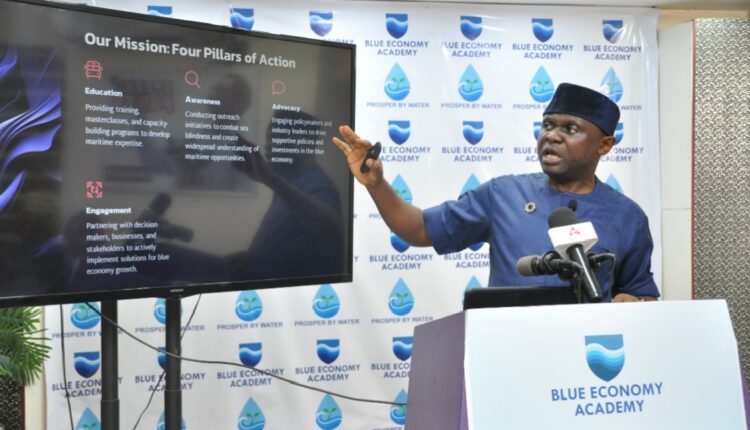Blue Economy Academy Charts Course For Nigeria’s Maritime Future
The Blue Economy Academy (BEA) has taken a bold step toward transforming nation’s maritime sector.
During a high-profile media luncheon, industry professionals, media personnel, and key stakeholders gathered to explore the Academy’s mission to unlock the vast potential of Nigeria’s blue economy.
A key moment of the event was the address by the Academy’s Founder, Mr. Ubong Essien, who presented the organization’s core vision: “Prosper by Water.” This vision focuses on combating sea blindness—the nation’s historical neglect of its maritime opportunities—by leveraging education, policy advocacy, and strategic collaboration to unlock the sector’s true potential.
The Academy aims to address critical challenges in the maritime space through four strategic pillars: which includes Education – Offering specialized training, masterclasses, and capacity-building programs led by industry experts,
Awareness – Promoting national dialogue on maritime opportunities and fostering engagement. Advocacy – Influencing policy decisions to support sustainable maritime development and Engagement – Ensuring long-term stakeholder commitment to implementing policies and initiatives.
Additionally, the Academy is structured around ten key Blue Economy pillars, referred to as the “Ten Blue Economy Buckets”:
Blue Commerce – Enhancing maritime trade and logistics.
Blue Bounty – Maximizing fisheries and aquaculture potential.
Blue Power – Exploring renewable ocean energy solutions.
- Advertisement -
Blue Cities – Developing sustainable coastal and waterfront cities.
Blue Governance – Strengthening policies and regulatory frameworks.
Blue Nexus – Integrating ocean-related industries for sustainable growth.
Blue Climate – Addressing climate change impacts on marine ecosystems.
Blue Talent – Developing human capital for the maritime sector.
Blue Venture – Promoting maritime entrepreneurship and investment.
During the event, media representatives shared their perspectives:
Paull Ogbuokiri, journalist at New Telegraph, noted, “The Blue Economy Academy is emerging at a time when Nigeria is exploring its maritime potential. It provides answers to the critical question of ‘how’ we can harness this vast resource.”
Coco McCrispy, CEO of Coco African TV, remarked, “The Blue Economy presents opportunities for Nigerians to shift focus from oil to maritime resources. The government’s involvement will be crucial in unlocking this potential.”
Ezinne Azuma, a respected figure in the maritime industry, commented, “This initiative has the potential to transform the sector. It is demystifying maritime education and closing gaps, which is crucial for industry growth.”
The gathering concluded on a hopeful note, with attendees agreeing that the Blue Economy Academy is well-positioned to drive sustainable maritime development, shape policy, and attract investment, while equipping professionals with the skills needed to lead Nigeria’s blue economy into the future.




Comments are closed.